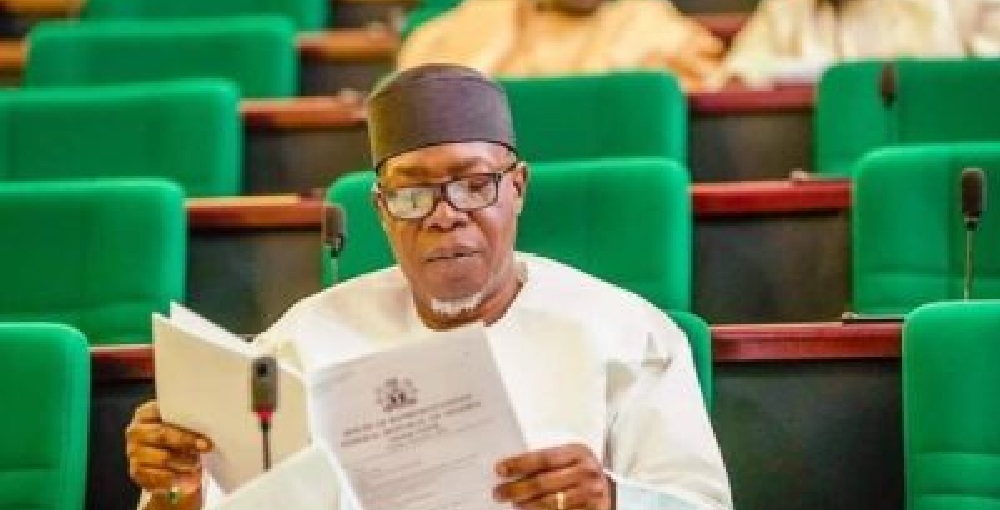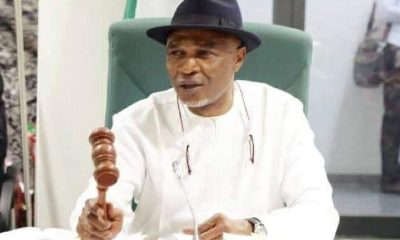News
Hail Nigeria! Where National Anthem Is Priority Over People

Ordinarily, Honourable Julius Ihonvbere, OON, Majority Leader, Nigeria’s House of Representatives, the man at the centre of the imbroglio over a “new national anthem”, should bear no lengthy introduction. But bear the ordinariness that the esteemed professor of politics has lowered himself to, for whatever reason.
A disagreement emerged Thursday on the floor of the House over the anthem that suited Nigeria better. Some wanted the current one, which rounds off its first stanza with this lie, “to serve with heart and mind, one nation bound in freedom, peace and unity”.
The old anthem that starts with, “Nigeria we hail thee, our dear native land, though tribe and may differ, in brotherhood we stand,” another lie, was the choice of others, who thought that the national song the British bequeathed was better. They were opposed by those who said a return to the 1960 anthem meant a preference for colonialism over our own 1978 home-made anthem.
Prof Ihonvbere, described on his website as, “A thinker of fresh ideas and a consistent community builder. An astute leader with a deep-seated passion to serve his people (Owan Federal Constituency, Edo State,” was the one who led the fast-forwarded bill for a new anthem.
The above description understates Ihonvbere, a political science scholar who taught in universities at home and abroad. He was an activist in the pro-democracy struggles under the military, fired his students out of intellectual laziness, and led ASUU, the university teachers’ group on protests over their conditions that have worsened since then.
He was a Special Adviser on Projects Monitoring when Olusegun Obasanjo was president. The ordinariness that has overtaken him as he makes the best of his political high office would worry those who knew him as a Democrat committed to politics that would elevate the well-being of his people.
Many voices were not allowed to contribute to the anthem debate as the furious drive to get the job done continued.
Their point was the bill was not on the day’s list of business. Some wondered why an anthem was so important.
Ihonvbere sponsored the bill that went through its first, second, and third readings on the same day. The bill was passed on the same day – a public hearing was not necessary.
“I believe that the old anthem, encompasses, contains, exudes the kind of energy, resourcefulness and a sense of vision that I believe is good for Nigeria,” Ihonvbere said.
He deserves applause from the quarters his Thursday’s enterprise served.
The Senate could apply more speed to pass it on Tuesday, on time for it to be used for Wednesday’s first anniversary of the Bola Ahmed Tinubu administration.
Why is a new anthem so important in a country where millions are dying from hunger? Why would legislators be so passionate about a bill that would not create jobs, solve security challenges, enhance the chances that businesses would survive or improve infrastructure?
President Tinubu gets what he wants. He does not have to explain anything to anyone. The hurry to get the old anthem back now appears to be a condition for the safety of Nigerians, as if our security agencies would not fight enemies any longer until they get an anthem that inspires them.
Tinubu’s acolytes would also count this distraction as another example of how strategic and long-term planner their boss is. Tinubu hinted at his dislike of the old anthem 13 years ago.
“Abandoning the post-independence anthem, which arguably evoked a strong spirit of patriotism and brotherliness, to compose a very drab replacement, is far less inspirational,” Tinubu said during a 2011 speech at the Nigerian Institute of Policy and Strategic Studies, NIPSS, Kuru, Jos.
Do you still ask why the killings in Plateau, Benue, Kebbi, and other parts of Nigeria get less attention than a national anthem? Why do we care more about meaningless words, made more meaningless by our leaders and their officials?
How many of our leaders stand in “brotherhood”? They can be counted in one hand with several fingers left. Are they not beneficiaries of “tribe and tongue” that differ? So, it is the current anthem that is responsible for the “labours of our heroes past” that are “in vain”? Should we agree that the revert to “Nigeria, we hail thee” will help us achieve “one nation bound in freedom, peace and unity”?
Nobody has considered the billions of Naira the project will consume. Rather, in fairness to the proponents of this major project, the importance of which is reflected in its speed through the National Assembly, the beneficiaries of this particular waste are waiting for their share of Nigeria’s shrinking resources.
The money that is about to be wasted could have been borrowed for priority projects. A new national anthem is a priority where uncertainty is the new order, where people feel so excluded from opportunities that their understanding of a nation deflates daily.
An old, new national anthem is one more charade that defines us as a country that delights in promoting nothingness to pronounced nothingness.
Whether we sing, “Arise, O compatriots”, or “Nigeria, we hail thee”, the verdict sounds like, “Nigeria, we hate thee”.
ELSEWHERE. David Nweze Umahi, Nigeria’s Minister of Works, who delights in wearing his engineering inexperience like an oversized toga, should have long announced his resignation. If anything, be sure that Umahi has qualified for higher office. All requests for Environmental Social Impact Assessment, ESIA, and Resettlement Action Plan, RAP, for the Lagos-Calabar Coastal Highway were met with all types of ad hominem. After destroying businesses and creating more unemployment, Umahi tells Nigerians, with a straight face, that the project would revert to the old plan that would have saved those businesses.
How did the super engineering skills of Umahi fail to note the sub-sea cables in his revised plan of this road that leads to nowhere (apologies to Osita Chidoka)? Will reverting to the old plan save money or escalate the cost of the project?
THE police should rein in its officers. Their return to brutalities on the roads, though not fully reported, is on the increase. The trending video of a police officer choking a taxi driver, in motion, is simply unbelievable. He had no concerns about his life or that of the driver and a passenger. Is it a new practice for a single policeman to arrest a suspect? Police in another “sting operation” arrested Madu Onuorah, a journalist, in his Abuja home, with his wife and children wondering what their family head did. What happened to inviting journalists – and other accused – to police stations where complaints were made against them? Are we regressing?
MAY 29 should be a day of national sobriety. Hopes have been lost, and ambitions stalled. All we have left are annoying questions about how we got here. More annoying is the noise about billions borrowed to be spent for causes we would never understand. Happy handover day, Nigerians.
SUICIDE is not a solution. As we say so, we should be worried about the number of Nigerians taking their lives, including students. Families and friends should look out more for themselves. Suicide is not a business of governments, as if we know what their business is.
*Isiguzo is a major commentator on minor issues
News
FAAC shares N1.578tr to federal, states, councils for March 2025

Monthly disbursements to the federal, states and local government areas dropped for the third consecutive time yesterday. The Federation Account Allocation Committee (FAAC) shared N1.58 trillion to the three tiers for March
The committee announced N2. 411 trillion as the total revenue generated in March at its April meeting in Abuja yesterday.
The total distributable revenue comprised N931.325 billion from statutory sources, N593.750 billion from Value Added Tax (VAT), N24.971 billion from the Electronic Money Transfer Levy (EMTL) and N28.711 billion from Exchange Difference revenue.
According to the communiqué issued by FAAC, the gross revenue available for March stood at N2.411 trillion. The deductions for cost of collection stood N85.376 billion, while N747.180 billion went to transfers, interventions and refunds accounted consumed.
Despite the lower net revenue available for distribution, the March statutory revenue of N1.718 trillion showed an increase of N65.422 billion over the N1.653 trillion received in February.
However, revenue from Value Added Tax (VAT) dropped to N637.618 billion last month from the February figure of N654.456 billion – a decrease of N16.838 billion.
From the total distributable sum of N1.578 trillion, the federal government received N528.696 billion; states collectively got N530.448 billion, while the 774 local government areas received N387.002 billion. Additionally, N132.611 billion – representing 13 per cent of mineral revenue – was allocated to oil-producing states as derivation revenue.
The breakdown of the N931.325 billion statutory revenue shows that the federal government took N422.485 billion, the states got N214.290 billion and N165.209 billion shared to the councils. The oil-producing states received N129.341 billion from this component as derivation revenue.
From the VAT pool of N593.750 billion, the federal government got N89.063 billion, states got N296.875 billion and the local government areas got N207.813 billion.
For the EMTL revenue of N24.971 billion, the federal government took N3.746 billion, states received N12.485 billion and local government areas went home with N8.740 billion.
In the case of Exchange Difference revenue of N28.711 billion, the federal government received N13.402 billion, states N6.798 billion and local government areas was allocated N5.241 billion. A further N3.270 billion from this revenue was distributed as 13 per cent derivation to oil-producing states.
A deeper look into the revenue trends shows that while Petroleum Profit Tax (PPT) and Companies Income Tax (CIT) increased significantly during the month under review, several other key sources witnessed declines.
These include Oil and Gas royalty, EMTL, VAT, Excise Duty, Import Duty, and Common External Tariff (CET) Levies.
News
Nigeria Police face backlash over viral cash gift video

A viral video showing several Nigerian police officers allegedly receiving N5,000 each from a Chinese man and his family has sparked widespread outrage and renewed concerns over corruption and ethics in the Nigeria Police Force.
The footage, which surfaced online, shows uniformed officers lining up as a Chinese man hands them cash gifts.
The incident has drawn sharp condemnation from the public and human rights advocates, who described it as disgraceful and damaging to the image of the police.
When contacted by Vanguard, Force Public Relations Officer, ACP Olumuyiwa Adejobi, said he was unaware of the viral video or the incident.
Similarly, the Lagos State Police Command distanced itself from the footage. Its spokesperson, CSP Benjamin Hundeyin, clarified that the incident did not occur in Lagos, contrary to claims circulating online.
Public figures have also weighed in. Omoyele Sowore, former presidential candidate of the African Action Congress (AAC), described the video as “shameful” and called for the removal of the IGP.
“This is why I keep saying illegal IGP Kayode Egbetokun must leave the police force. It is the shame of the nation,” he wrote in a Facebook post.
Popular social commentator and human rights activist Martins Victor Otse, also known as VeryDarkBlackMan, called the act “disgraceful, disrespectful, and degrading,” urging the police leadership to address the matter transparently.
The incident has intensified calls for accountability, with many Nigerians demanding disciplinary action and systemic reforms to restore public confidence in the police force.
News
Easter celebration: FG declares Friday, Monday public holidays

The Federal Government has declared Friday, April 18, and Monday, April 21, 2025, as public holidays to mark Good Friday and Easter Monday.
This was disclosed by the Minister of Interior, Dr Olubunmi Tunji-Ojo, on Tuesday.
He emphasised the importance of embodying the virtues of the sacrifice and love displayed by Jesus Christ, who had to die for the redemption of man, while greeting Christians on the joyous occasion.
In a statement by the Permanent Secretary in the ministry, Dr Magdalene Ajani, the minister called on Nigerians to use the holiday period to pray for the peace, unity, and stability of the nation.
He reassured citizens of President Bola Tinubu’s commitment to the Renewed Hope Agenda, which seeks to foster national growth and development.
“Furthermore, he encouraged Nigerians to extend love and goodwill to their neighbours through acts of kindness and generosity.
“The minister wished all Christians a blissful Easter celebration and extended warm holiday greetings to all Nigerians,” the statement added.
-

 News21 hours ago
News21 hours agoTears, anguish as Plateau Community buries 51 killed by bandits
-

 News20 hours ago
News20 hours agoSHOCKING! One month after giving birth, woman discovers another baby in her womb
-

 News18 hours ago
News18 hours agoCBEX: 60 fraudulent Ponzi scheme operators to avoid in Nigeria
-

 News20 hours ago
News20 hours agoAngry investors raid CBEX office, loot assets in Ibadan after digital Platform crash
-

 Politics20 hours ago
Politics20 hours agoIgbo Youths Set To Mobilize 5 Million Man-March In Support Of Tinubu, Kalu
-

 News20 hours ago
News20 hours ago‘Not something I’d wish on anyone’ — Melinda Gates opens up on divorce
-

 News17 hours ago
News17 hours agoAgbakoba questions inconsistencies in Natasha’s sexual harassment allegations against Akpabio
-

 News15 hours ago
News15 hours agoReps Minority Caucus decries incessant tanker fire explosions, call for decisive actions to avert future occurrences






